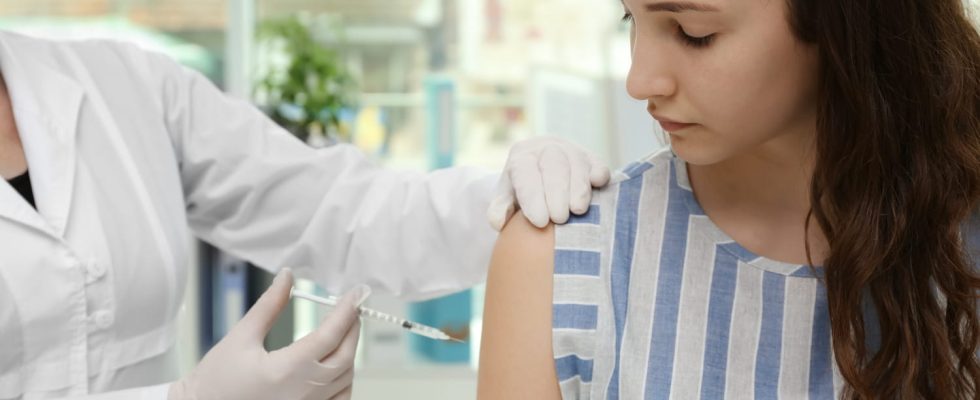Vaccination against the papillomavirus or “HPV” has been offered to middle school students from 5th grade since October 1, 2023. The objective is to protect them from the subsequent risk of cancer.
Virus transmitted during the sexTHE papillomavirus or HPV (Human papillomavirus) can stay asleep for years before waking up and lead to genital warts or more seriously cancers. Every year in France, more than 6,000 new cases of cancer And 30,000 precancerous lesions of the cervix are caused by papillomaviruses. If the three quarters of these cancers affect women (with firstly the cancer of the cervix), A a quarter of them occur in men (ENT cancers mostly). Vaccination against papillomavirus is possible in France since 2007 for girls And 2021 for boys but the rate of vaccination coverage remains insufficient according to health authorities: 37% for girls and 9% for boys. The objective is to reach a rate of 80%. As announced by Emmanuel Macron in February 2023, the Ministry of Health launches a campaign vaccination for middle school students in 5th grade from from October 2023. Several countries like Sweden, Australia and the United Kingdom, have implemented HPV vaccination in schools,
The role of vaccines is to trigger the production of antibodies against HPV
The HPV vaccine is recommended for girls and boys between 11 and 14 years old (catch-up is possible up to age 19). THE girls and boys students in 5th grade at the start of the school year will thus be able to be vaccinated at school against the papillomavirus. The aim of vaccination is to prevent papillomavirus infection during future sexual intercourse. “The role of vaccines is to trigger the production of specific antibodies against each of the HPV viruses” explains itMedicines Agency. The vaccine protects against the majority of papillomaviruses responsible for cancer of the cervix, anus, vulva and vagina. It also protects against the appearance of anogenital warts.
What vaccines will be given to children?
Two vaccines are available:
- Cervarix : against papillomavirus types 16 and 18.
- Gardasil 9 : against types 16, 18 + 31, 33, 45, 52 and 58.
Vaccines are not interchangeable. A vaccination started with one must be finished with the same. The High Council of Public Health recommends initiating a new vaccination with Gardasil 9 for the unvaccinated. “Gardasil 9 targets HPV responsible for 90% of cervical cancers, 80% of anal cancers and 90% of anogenital warts (condyloma)” informs the Ministry of Health. There is no no reminder. 2 or 3 injections are enough depending on age.
Will parental consent be required?
Yes, “the agreement of both parents will be necessary to carry out this vaccination” can we read on the government website.
How many doses?
To carry out a complete vaccination schedule of 2 doses (at least 6 months apart), necessary for the effectiveness of the vaccine, the first dose will be offered in the fall. The second dose will be before the end of June 2024.
Is vaccination free?
Yes, vaccination against papillomavirus is free for children.
Is the papillomavirus vaccine compulsory?
No, the papillomavirus vaccine is not part of the list of 11 compulsory vaccines in France. Vaccination has been offered at the college since September 2023 and will be done on the basis of volunteering.
How effective is the HPV vaccine?
Studies conducted in Australia, the United States and France estimated the effectiveness of vaccines against HPV infections between 86% and 96% among women, reports the National Medicines Agency. A international analysis published in 2014 showed a effectiveness against high-grade precancerous lesions between 84% and 94%. In men, an international trial involving 4,055 men aged 16 to 26 showed an effectiveness of almost 90% to prevent anogenital warts (sexually transmitted) caused by HPV viruses (types 6, 11, 16, 18). “Overall, the results show that the vaccine is most effective when administered before the start of sexual life“ confirms theANSM. After the injection, the most common side effects are pain, redness, swelling or bruising at the injection sitesometimes associated with fever, headache, nausea, muscle or joint pain.
